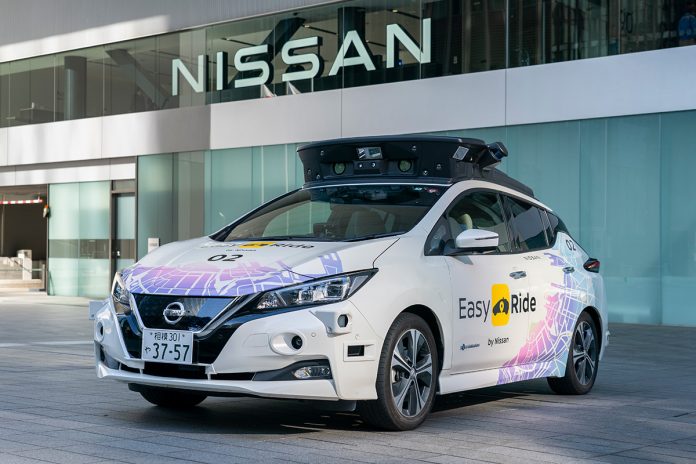Nissan has begun testing a prototype Leaf equipped with its proprietary autonomous drive technologies. Through this pilot, the OEM is aiming to demonstrate the progress it is making towards rolling out its own autonomous mobility services within 2027.
The prototype EV integrates 14 cameras, 10 radars and 6 LiDAR sensors, and works to demonstrate Nissan’s progress in the field of autonomous driving – particularly within complex urban environments. In addition to these technologies, the test vehicle also integrates new roof-mounted sensors that help expand the size of its detection area, while also enhancing the accuracy of its detection capabilities.
These sensors likewise enhance the prototype’s recognition performance, behavioral prediction, and judgment functions, as well as its control functions to support smooth operation in complex driving scenarios. Around the streets of Yokohama, for example, the Leaf prototype can predict the behavior of pedestrians, conduct lane changes when merging, and judge when to safely enter intersections.
This prototype represents the latest step for Nissan as it continues to pursue its goal to launch autonomous mobility services within Japan from 2027 (in conjunction with local authorities and transport operators). Nissan confirmed that the prototype is today operating at SAE Level 2, with a safety driver present behind the wheel at all times, though it will continually expand the car’s autonomous capabilities in the future.
In Q4 2024, Nissan aims to expand its AV trials to the Minato Mirai area in east Yokohama, before conducting service demonstration tests within 2025. During these service trials the OEM will gradually increase the level of autonomous driving functionality offered by the Leaf prototype, while assessing customer acceptance of the model, ultimately aiming to utilize the model in its future driverless mobility services.
Nissan’s AV pilot is being conducted in close cooperation with the Japanese Ministry of Economy, Trade and Industry; the Ministry of Land, Infrastructure, Transport and Tourism; and other central ministries. At the Level 4 Mobility Acceleration Committee organized by these ministries, they will promote similar initiatives that together support the realization of new autonomous mobility services.
Through this latest AV demonstration, Nissan is more broadly seeking to solve transportation service issues faced by local communities in Japan, including driver shortages and similar mobility challenges coming as a result of the country’s ageing population. Through the introduction of its future mobility services, Nissan aims to tackle these issues and enable free movement for these communities.











